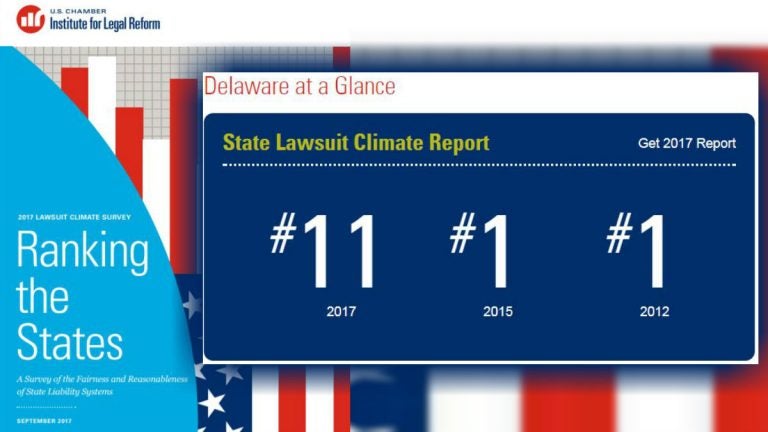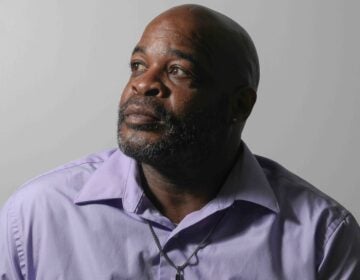Delaware slips in ranking in legal climate report

(image via U.S. Chamber Institute for Legal Reform)
Delaware has fallen short this year in an annual report that explores how fair the states’ tort liability systems are to businesses.
The Lawsuit Climate Survey published by the U.S. Chamber of Commerce reports Delaware’s ranking has dropped from 1st place to 11th place when it comes to the states’ liability systems, perceived by businesses.
South Dakota takes the top spot, leading by 2.8 percent.
Delaware is one of only three states that remained stagnant in this year’s report—and it’s the first time in the 15 years the report has been released the state hasn’t been on top of the leader board.
“I think this is a wakeup call for Delaware,” said Bryan Quigley, SVP of strategic communications at the U.S. Chamber of Commerce.
“I think it’s an opportunity for them to look at their courts and their laws, and more importantly, who’s competing with them, what the other states are that have passed them, because at the end of the day this is more about Delaware sticking in place while other states are passing them by.”
Survey participants comprise of a national sample of 1,321 in-house general counsel, senior litigators or attorneys and senior executives at companies with at least $100 million in annual revenues. Participants must be knowledgeable about litigation matters at companies and have recent litigation experience in each state they evaluate.
Quigley said one reason Delaware fell in the rankings might be because Delaware banned companies from imposing “loser pays” rules—where investors who bring and lose lawsuits are forced to pay the company’s legal costs.
Companies also have taken notice of larger verdicts in Delaware, particularly among asbestos cases, Quigley said.
Eighty-five percent of respondents in the survey said a state’s lawsuit environment is likely to impact their company’s decisions about where to locate or expand operations.
“Delaware has been a central state in terms of being friendly to business, and so when they do things that make the business community stand up and take notice in their laws it does have an outsized impact,” Quigley said
He said eight of the top 10 states have enacted a variety of laws to ensure parties found at fault in a lawsuit pay their fair share.
“If you are a defendant and are found 1 percent liable you could get stuck with 100 percent of the damages in Delaware, but eight of the top 10 states have laws to curb this,” Quigley said.
Other states also have passed laws to curb what he calls “jackpot jury awards,” or “outsized awards or verdicts.”
“All businesses want is a fair chance in court, a balanced legal system. Businesses know they’re not going to win in court all the time,” Quigley said. “The issue is, ‘Is the system fair? Are the judges fair and consistent? Is the law fair to both parties? I don’t think that means that happens at the expense of plaintiffs or people who have been harmed.”
James DeChene, vice president of government affairs for the Delaware Chamber of Commerce, also has noticed a difference in the state’s legal climate.
“I think there’s been a prevalence now toward plaintiff-friendly legislation, plaintiff-friendly court decisions—it’s just been a shift in how Delaware has viewed itself and what it prioritizes,” he said.
“Even though there’s been some friendlier decisions recently from chancery court and Supreme Court, I think there’s still a perspective out there this is the shift Delaware is taking, and it’s going to take some time for its reputation to correct itself.”
DeChene said he also believes the state has imposed too many regulations on businesses.
“I think if you look at the last few years of what the General Assembly has focused on, it’s been focusing more on the employee than the employer, and having more regulations designed to impact the business community,” he said.
“Our message has been we don’t necessarily mind regulation, but let’s not put them in so much that they are choking off innovation in Delaware and a business’ desires to be located here. Anything you do that makes it more difficult for a business to be successful in Delaware is going to have a long-term impact and you’re starting to see that.”
However, Delaware Law School professor Lawrence Hamermesh said while the move from 1st to 11th seems large, the percentage difference of 2.8 percent is less significant, especially because it’s also the margin of error.
“It’s possible to take this change too seriously, and the fact Delaware was number one for so long is remarkable,” he said.
Hamermesh also takes issue with some of the criteria scores in the report, including jury fairness, as many corporate cases take place in chancery court, which doesn’t have a jury. He also said he doesn’t understand why the criteria of a trial judge’s impartiality has decreased in score.
“It’s mostly the same judges from two years ago, and the new judges seem to me, from knowing them and from their career stories and their method of appointment, I have no reason to think their level of impartiality or partiality has changed one bit,” Hamermesh said.
He said the courts also have made some changes that actually are beneficial for the business community.
The court has tightened up the acceptance of settlements of shareholder class action lawsuits and awards of attorney’s fees that are based on nothing more than additional disclosures—where the class didn’t get any money in the litigation but the case was settled based on the basis of additional disclosures only, Hamermesh said.
He also said there was a series of cases that broadened the ability and obligation of the court of chancery to dismiss stockholder class actions.
“The bottom line of all this is, far from Delaware becoming increasingly a haven for shareholder class action litigation, a lot of it has gravitated to other places, particularly in federal courts,” Hamermesh said.
Quigley notes that many states ranking below Delaware would be more than pleased with an 11th place ranking, and he sees no reason why Delaware can’t climb the ranks if it addresses some of these issues.
“I think for Delaware, which has never been lower than number one, it probably is a wakeup call, but I think it’s a relatively good state and I think this is a state that wants to be number one, wants to be in the top 10 and there’s no reason why it can’t improve in the next two years when we do our survey again,” he said.
DeChene echoes Quigley’s comments.
“I think right now Delaware’s reputation is still strong, even though there are other states nipping at our heals, I think by and large it’s recognized Delaware’s chancery court is not something you can replicate overnight, it has hundreds of years behind it of being an institution that has been viewed as overall a very fair and adaptive court,” he said.
“There’s no reason to believe it will not continue to prevail as a premier presence for companies to incorporate and for cases to be heard.”
WHYY is your source for fact-based, in-depth journalism and information. As a nonprofit organization, we rely on financial support from readers like you. Please give today.





